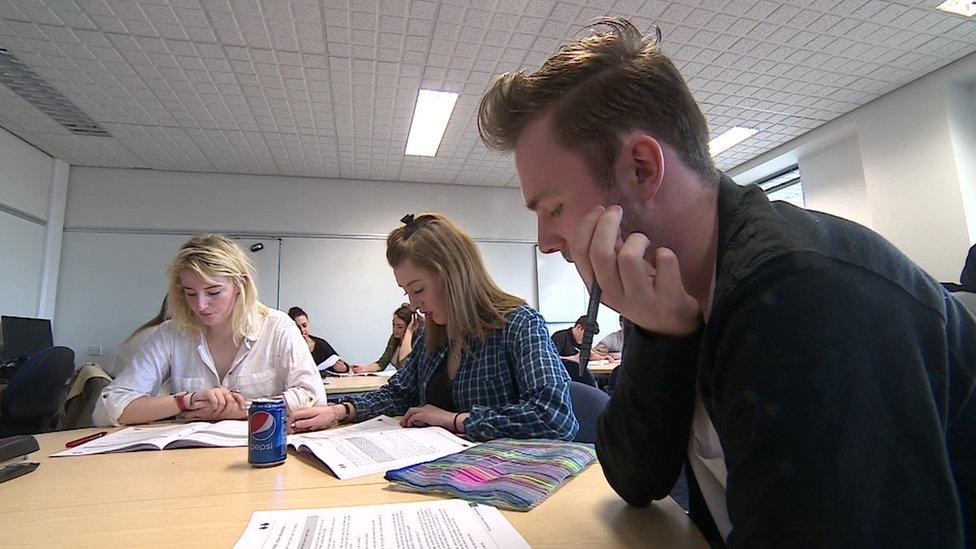Uni watchdog floats staff-student relationship ban
- Published

Relationships between staff and students should be documented or banned, England's universities regulator has proposed.
Draft plans from the Office for Students (OfS) centre on relationships where the staff member has responsibilities toward the student.
The plans form part of a consultation on tackling harassment and sexual misconduct, which runs until May., external
Universities UK (UUK) said it would work with the OfS on the proposals.
The National Union of Students said students may be reluctant to report misconduct by staff out of fear that it could impact their grades.
The OfS, which regulates universities in England, said harassment and sexual misconduct were "serious issues" in English higher education.
It said standards for universities and colleges to follow on a voluntary basis, set out in 2021, had resulted in "some improvements".
However, it concluded that practices varied across the sector, and reported incidents were not always followed up formally.
The regulator plans to introduce a new requirement for higher education providers focused on students and what it calls "relevant" staff members - that is, any staff member who has a professional responsibility for a student, such as teaching or assessing.
In its consultation, it is asking for views on two possible options:
The first, which the OfS calls its "preferred option", requires staff members to tell the university about any relationship they have with a student they are responsible for; the given information would then be logged in a register
The second is to ban entirely relationships between students and any staff members who interact with them professionally
The OfS said universities and colleges should take "appropriate disciplinary action" if a staff member does not comply in either case - including dismissal.
The regulator said it recognised that its proposals would "limit" the autonomy of students and staff, with OfS chief executive Susan Lapworth emphasising that most higher education staff behaved appropriately towards students.
But she added, "there can be a power imbalance in personal relationships that could be exploited by unscrupulous staff to subject students to harassment or sexual misconduct".
Some universities, such as UCL, external and the University of Nottingham, external, already ban relationships between students and the staff who work professionally with them.
Others, such as the University of Westminster,, external offer "bystander training", which are recommended by UUK, and aim to help students identify problematic situations.
Other plans in the OfS consultation include:
Requiring each university or college to publish a document outlining its approach and policies on staff-student relationships
Banning the use of non-disclosure agreements that prevent students from talking about their experiences
The NUS, which represents university and college students across the UK said four in 10 students have reported experiencing sexual misconduct while at university - but concluded "the problem is likely [to be] more extensive" .
It stated there was not enough support for students who reported misconduct from staff.
"Students who experience misconduct from staff members may be reluctant to report for fear of retribution that could impact their grades," it said, in statement - adding that a "cultural shift" involving more training was needed.
UUK, which represents 140 universities in the UK, said its members took harassment and sexual misconduct "extremely seriously and have been working hard to meet their obligations in this area".
"However, we recognise that there is still work to be done," their statement said.
"We look forward to working with OfS, so that these proposals will further strengthen universities' own efforts to ensure student safety."
The OfS is asking anyone with an interest in higher education, or in harassment prevention and support, to share their thoughts in its consultation.
A summary of the responses will be published later in 2023.


Have you been affected by issues covered in this story? Share your experiences by emailing haveyoursay@bbc.co.uk, external.
Please include a contact number if you are willing to speak to a BBC journalist. You can also get in touch in the following ways:
WhatsApp: +44 7756 165803
Tweet: @BBC_HaveYourSay, external
Please read our terms & conditions and privacy policy
If you are reading this page and can't see the form you will need to visit the mobile version of the BBC website to submit your question or comment or you can email us at HaveYourSay@bbc.co.uk, external. Please include your name, age and location with any submission.
Related topics
- Published18 January 2022

- Published19 April 2021

- Published3 November 2016
